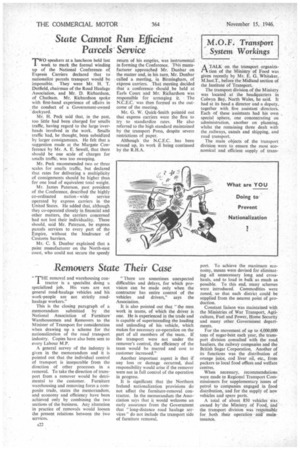State Cannot Run Efficient
Page 24

If you've noticed an error in this article please click here to report it so we can fix it.
Parcels Service
'TWO speakers at a luncheon held last
week to mark the formal winding up of the National Conference of Express Carriers declared that to nationalize parcels transport would be impossible. They were Mr. H. T. Duffield, chairman of the Road Haulage Association, and Mr. D. Richardson, of Chatham. Mr. Richardson spoke with first-hand experience of affairs in the conduct of a Government-owned dockyard.
Mr. H. Peck said that, in the past, too little had been charged for smalls traffic, having regard to the large 'overheads involved in the work. Smalls traffic had, he thought, been subsidized by larger consignments. He felt that a suggestion made at the Margate Conference by Mr_ A. E. Sewell, that there should be one scale of charges for smalls traffic, was too sweeping.
Mr. Peck recommended two or three scales for smalls traffic, but declared that rates for delivering a multiplicity of consignments should be higher than for one load of equivalent total weight.
Mr. lames Paterson, past president of the Conference, described the highly co-ordinated nation wide service operated by express carriers in the United States. He added that, although they co-operated closely in financial and other matters, the carriers concerned had not lost their individuality. There should, said Mr. Paterson, be express parcels services to every part of the Empire. without the hindrance of Customs barriers.
Mr. C. S. Dunbar explained that a paint manufacturer on the North-east coast, who could not secure the speedy return of his empties, was instrumental in forming the Conference. This manufacturer approached Mr. Dunbar on the matter and, in his turn, Mr. Dunbar called a meeting, in Birmingham, of express carriers. That meeting decided that a conference should be held at Earls Court and Mr. Riatardson was responsible for arranging it. The N.C.E.C. was then formed as the outcome of the meeting.
Mr. G. W. Quick-Smith pointed out that express carriers were the first to try to standardize rates. He also referred to the high standard maintained by the transport Press, despite severe restrictions of paper.
Although the N.C.E.C. has been wound up. its work ig being continued by the R.H.A.




































































